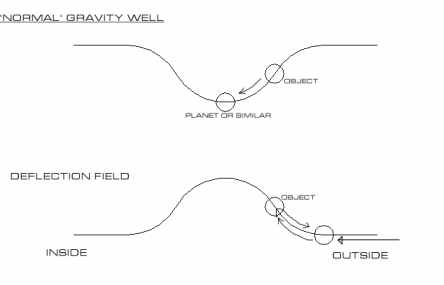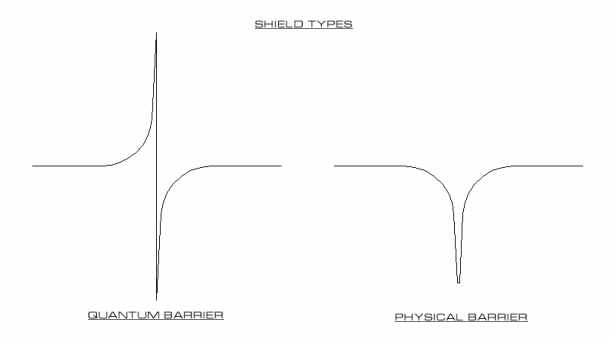

|
field technologies |
|
This generic term for a branch of technologies that deals with creating artificial distortions in space (time as well in stasis) provides the basic utilities of star faring, providing not only the propulsion through the space, but also protection from particles and radiation. However the use of field technology is not solely restricted to space flight but is also used in terrestrial applications. The various types of shield technology in use in the Federation are mentioned below, with descriptions of how they work, and where they are used.
Shield type fields
Use: These fields are used on starships where they distort space to create a propulsive effect. They are principally used in two modes, which work in quite distinct ways. The first mode is the perpetual fall, distorting space in front of the spacecraft, creating a source of artificial gravity, the starship falls towards it, and as the generated field moves along with the ship, the effect is a continuous fall into a gravitational well. As the fall can be prolonged infinitely there is continuous acceleration of the vessel, and near light speeds can be generated. There are some particular problems with this method of flight, the main is that speeds in excess of light can never be achieved (and additionally time dilation effects are also generated), the second is that this method of propulsion does nothing to prevent impacts with particles in the interstellar space, which at these velocities can be catastrophic. The second mode is far more sophisticated but also far more energetically expensive. This second mode does not involve accelerating the starship, rather the craft is moved through space distorting the space around the vessel in effect bypassing the ship from travelling through the intervening space itself. This method has the major advantage of being able to generate field effects where the ship at the centre is able to travel faster than light, though maintaining its original velocity. Also by amalgamating into the propulsion field structure certain patterns particles in ambient space are deflected away from the oncoming vessel. In either mode the driver coils consume vast amounts of power, consuming more than any other starship application, and for this reason ties starships to having huge powerplants. Though the transduction of the energy to the spatial distortion is relatively efficient the generated propulsion fields are of enormous proportions, often many cubic kilometres with field distortions of magnitudes greater than neutron stars (though these fields are limited to the few cubic kilometres around the ship). The propulsion field is a precise tailoring of space where an asymmetry in the fields is used to propel a ship directly, or indirectly through the void.
Use: to repulse matter away from the field, or alter its trajectory, the most important use of which is on starships. Deflection fields are a specific kind of field distortion, which creates a kind of anti-gravity. If one considers natural celestial bodies, such as stars and planets, we envisage them at being at the centre of a gravitational well, where matter is drawn in down the curvature they cause in space, the way that spatial curvature effects objects is what we come to know as gravity. Deflector fields are the inverse of this particular situation, where the curvature is negative, and so objects are flung away rather than drawn to the centre of the well. The use of this kind of field is extensive on starships, where they are used to repel matter from the propulsion fields (matter caught in the enormous gravitational shear amongst the fields is annihilated, and disruptive to flight), though rather than being generated as a point source, it is created as a thin shell around the propulsion fields, and any approaching matter is deflected by negative gravity. Deflection fields are also used by a whole host of other ‘antigravity’ devices, which range from landing devices to slow descent, to weather modification generators which use it to gently push bodies of air about. As these applications only require very thin layers of field (rather than solid volumes) and perhaps of only limited strength they are far less energy demanding compared to propulsion fields. ‘Shields’ these fall into two distinct types, they both are used to create a physical barrier. This particular type of shield works by generating an immensely steep but effectively infinitesimally wide gravitational well, projected as a thin sheet around the generator it creates an effectively impenetrable barrier to all forms of energy. Because the rift is so very small, smaller than the wave like properties of matter and light, they cannot penetrate. Matter approaching these fields simply rebounds as if there was a solid surface, but unlike a solid material atoms and light cannot not adhere of be absorbed to it. Though these fields seem to offer perfect defence against matter and radiation they are very susceptible to field effects until very recently it has been impossible to produce a quantum barrier on a planet’s surface as even the modest well caused by the planet’s mass disrupts the field enough to allow penetration. Another problem with this kind of barrier is that the physical repulse of matter off it transfers some energy to the field, and temporarily destabilises it enough, though not so much to make it matter permeable. This kind of shield is used to protect starships as well as other Federation assets in a defensive capability, but is also used in the heart of many other technologies. Because it effectively generates perfect insulation from matter and energy it is used in transporter technologies, as well as the ultra high energy applications, such as in starship powerplants, where physical matter cannot be used as a shielding material. The physical barrier type shield is a little different to a quantum barrier, though it generates a deep spatial curvature, it is sufficiently wide to trap matter. The generated field in effect creates a region where the gravity is so intense, that it rivals a neutron star’s surface. This region is thick enough to allow matter to permeate where it becomes trapped in the deep field. Incoming matter would gain energy falling down the well into the field, but would still have insufficient to climb out of the well on the other side, in effect matter is trapped within the shield distortion. Although this kind of shield can be used to protect against matter impact, it is frequently filled with plasma to create an effectively impermeable physical barrier, where the trapped matter has been pulled together into an almost degenerate state by the immense fields that encase them. Physical barrier type shields are used in defensive roles, though they are also used to divide environments. Much weaker versions can be used to generate pressure barriers, which are used over wormhole termini to stop bulk atmospheric, flow between environments. These type of shields are also used in place of real material barriers, for example to protect cities against storms, or to prevent sand encroachment in deserts.
Both of the types of ‘shield’ technologies are relatively low power as again their volumes are relatively limited, though the cost of these two types of field technology is that their effectiveness relies on the ultra high precision machinery that emits the field, because if they behave other than effectively mathematically perfect they are much less effective. |












